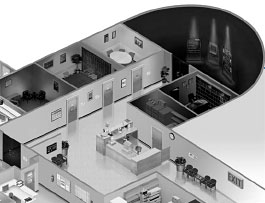Virtual fellowship teaches genetics via CD or the Web
There's no doubt about it, Joseph Henderson, M.D., knows a lot of stuff. Stuff like epidemiology, public health, statistics, scientific visualization, decision-support systems, diving medicine, cellular neurophysiology, and computer- programming.
Stuff: The director of DMS's Interactive Media Laboratory, Henderson has spent the past three years drawing on this "stuff" to create an interactive educational program titled "Genetics in Clinical Practice: A Team Approach." He was the designer, author, director, and producer of the program, which has just been released. He even gets a credit for the music.
The program takes the user into a "virtual practicum," or mini-fellowship, on the evaluation and testing of genetic diseases. It is aimed at third-year medical students, residents, or primary-care providers and is available on CD or at http://iml.dartmouth.edu/education/cme/Genetics/. Henderson collaborated on the project with the Centers for Disease Control and Prevention and the American College of Medical Genetics.
Via computer, the user enters an exam room and interacts with four simulated patients, some of whom come back for repeated visits. The patient and the attending physician ask questions, which the user answers by selecting from a menu of responses; the program gives immediate feedback on the choices. The user can also sit in on genetic counseling demonstrations or listen to world experts in genetics. Or, in a "lectures kiosk," the user can hear Francis Collins, M.D., Ph.D., director of the Human Genome Project, discuss the future of medical genomics.

|
|
This "clinic" is the setting for a genetics educational program developed at DMS. |
There are five other mini-lectures by authorities on various aspects of genetics. Of course, the user can't ask questions of any of these experts, but the program provides links to Web sites with up-to-date information on genetic testing. There are also video interviews with four real patients affected by genetic conditions. Finally, there are virtual genetics laboratories, where the user can learn how genetic tests are done. "Genetic testing is not like ordering a cholesterol level," Henderson points out. "You need to have an appreciation of the science behind such testing, as well as sensitivity toward the associated psychosocial aspects.
Exacting: "It takes exacting people skills and experience to counsel a couple where the wife is pregnant with a child that might have a devastating genetic disease, such as cystic fibrosis," he adds. "The testing is expensive, may not be covered by medical insurance, and it can lead to stigmata."
Some of the "stuff" that Henderson brings to his unusual line of work he learned at SUNYBuffalo (where he earned a master's in physiology and his M.D.), some at Yale (where he earned an M.Phil. in epidemiology), and some as a career naval officer; he retired from the Navy in 1988 and came to DMS in 1989.
A useful feature of his latest program is that it can be terminated at any time, and the computer will remember where the user was so the practicum can be reactivated at that point. Learning in this manner is especially attractive for practitioners who did their training before genomics became the clinical discipline it is today. The program even includes a form so users can claim continuing medical education credit. Those who do the whole program are eligible for 10 hours of credit, but it's possible to pick from dozens of options.
Now, as users immerse themselves in his newest program, Joe Henderson will be trying to stay abreast of the technology curve by learning still more stuff.
Roger P. Smith, Ph.D.
If you would like to offer any feedback about this article, we would welcome getting your comments at DartMed@Dartmouth.edu.
